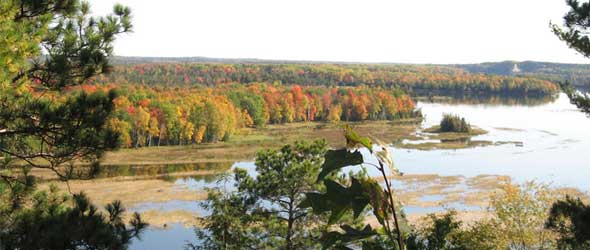Asian Carp — On the Docket in D.C. and Chicago; On the Menu in Michigan
Federal judge rejects Asian carp injunction as Congress passes a ban on their import.
By Steve Kellman
Circle of Blue

A federal judge in Chicago rejected a request for a preliminary injunction to close Chicago-area shipping locks Thursday, casting doubt on a legal case brought by five Great Lakes states to block Asian carp. But just two days prior, a Michigan-based environmental action council drummed up more than a hundred carp adversaries by serving the silver fish on a silver platter.
On the Docket
The 61-page decision by Judge Robert M. Dow, Jr. argues that the lawsuit–brought by the states of Michigan, Minnesota, Ohio, Pennsylvania, and Wisconsin–is unlikely to prevail at trial. The judge added that the plaintiffs have failed to prove that the invasive species is an imminent threat to the lakes. He also raised questions about the environmental DNA evidence used to indicate that the carp have breached electric barriers designed to keep them out of the lakes.
“The Court stresses its recognition that the potential harm in a worst case scenario is great,” Dow wrote. “However, Plaintiffs have not presented sufficient evidence to demonstrate either (1) more than a modest likelihood of success on the merits of their substantive claims or (2) that the potential harm is either likely or imminent.”
-Mike Cox
Michigan Attorney General
Michigan Attorney General Mike Cox, who is spearheading the legal fight which has included a failed Supreme Court suit, reacted with frustration to the judge’s decision with a political broadside against President Barack Obama, who previously served in the Illinois state senate and as a U.S. Senator representing Illinois.
“President Obama, order the Army Corps to close the locks and expedite a plan for the permanent separation of the Great Lakes from the Mississippi River basin,” Cox said in a statement. “The entire Great Lakes region should not be held hostage by the state with the least amount of shoreline and the greatest amount of your political friends. Until you act, Michigan and our Great Lakes partners will keep fighting to protect our livelihood from the imminent threat of Asian carp.”
Cox said Thursday’s decision would not end the states’ legal case. Judge Dow has scheduled a Janury 7 status hearing to determine how the case will proceed, but a Michigan-based environmental law organization sees Thursday’s ruling as a serious blow.
“It’s certainly not good news for the case,” said Nick Schroeck, executive director of the Great Lakes Environmental Law Center, in an interview with Circle of Blue. The organization has been working with state leaders and conservation groups to stop the spread of invasive species in the Great Lakes.
“It’s tough to ask a judge to close down a waterway like that; it would have been an extraordinary step,” Schroeck said. “Of course, this is an extraordinary problem.”
Since escaping from fish farms and sewage treatment plants in the Southern United States, the invasive Asian carp has colonized long swaths of the Mississippi and Illinois rivers, displacing native species and profoundly altering the ecosystem. The silver carp variety, which can grow to over 60 pounds and more than three feet long, is known for leaping out of the water at the sound of boat motors, injuring boaters and damaging equipment, as seen in the 2009 film Water Life. The bighead carp variety can grow to weigh 110 pounds and reach lengths of four feet or more.
On the Menu
In Grand Rapids, Michigan on Tuesday night, chefs at the San Chez Bistro restaurant turned up the heat on Asian carp, cooking several dishes featuring the invasive species. The menu was prepared as part of a fundraising and awareness-raising event for the West Michigan Environmental Action Council (WMEAC).
-Rachel Hood
Director of WMEAC
Rachel Hood, WMEAC’s executive director, told Circle of Blue that the event accomplished its mission, drawing close to 120 people who dined on dishes ranging from carp and artichoke meatballs with a side of “motor oil mayo,” to chocolate carp brownies and “pond scum,” a sickly green gelatin with carp and sesame seeds.
“It wasn’t your typical fish fry,” she said.
The event also proved controversial in some environmental circles, Hood added. While WMEAC is working to prevent the carp from getting into the Great Lakes, some feared that serving the fish for dinner sent a mixed message about the group’s position.
“A good amount of people were confused about that message and kind of the inherent conflict,” Hood said. “Our local Trout Unlimited group was pretty upset about it.”
The diners were also treated to an update on federal efforts to control the fish by John Goss, Asian carp director for the White House’s Council on Environmental Quality. Dubbed the “carp czar” in the press, Goss is overseeing the federal government’s $80 million effort to keep the fish from colonizing the Great Lakes and threatening its $7 billion sportfishing industry.
That effort has been criticized repeatedly for its pace, with five Great Lakes states filing a lawsuit to force quicker action on the closure of Chicago-area locks that may act as a gateway for the fish. The U.S. Army Corps of Engineers has begun a comprehensive study of ways to prevent invasive species migrations between the Great Lakes and the Mississippi River—but final recommendations are not expected until 2015.
“The most important message that we received from John was…that while the Army Corps of Engineers may be taking four or five years to complete their study, there are interim steps that they may be taking as needs arise,” Hood said. “Five years is just too long to wait.”
As an example, she said, Goss mentioned that the government is studying some 30 locations that could need to be blocked, as potential flooding in these areas might carry the fish closer to Lake Michigan.
“The process is littered with opportunities for action—direct action—to address the issue in immediate ways,” she said. “Hopefully action will happen.”
WMEAC and other environmental organizations will be working to assure that federal funding for such efforts is not cut by the incoming Congress, Hood said. In the meantime, the current lame-duck session of Congress has had Asian carp on its plate.
Late Wednesday, the U.S. House passed the Asian Carp Prevention and Control Act. The bill, which the Senate passed last month, would add the bighead carp species of Asian carp to a list of dangerous animals banned from being imported or shipped into the United States. (Silver carp are already on the banned list.)
The bill now goes to President Barack Obama for his signature.
Steve Kellman is a Circle of Blue writer and reporter. Reach him at circleofblue.org/contact.
Sources: Chicago Tribune, Grand Rapids Press, Cleveland Plain Dealer, West Michigan Environmental Action Council









Leave a Reply
Want to join the discussion?Feel free to contribute!